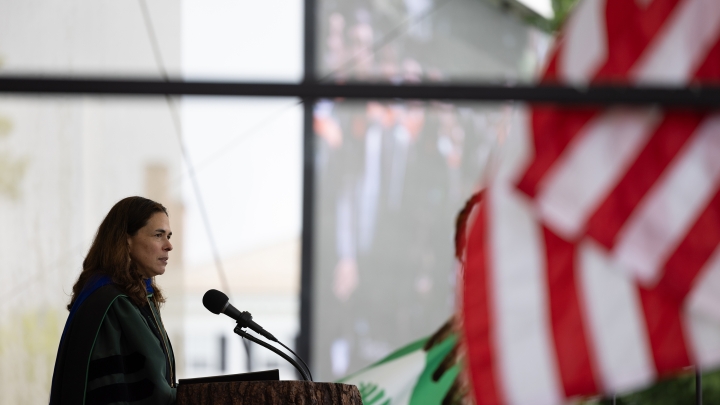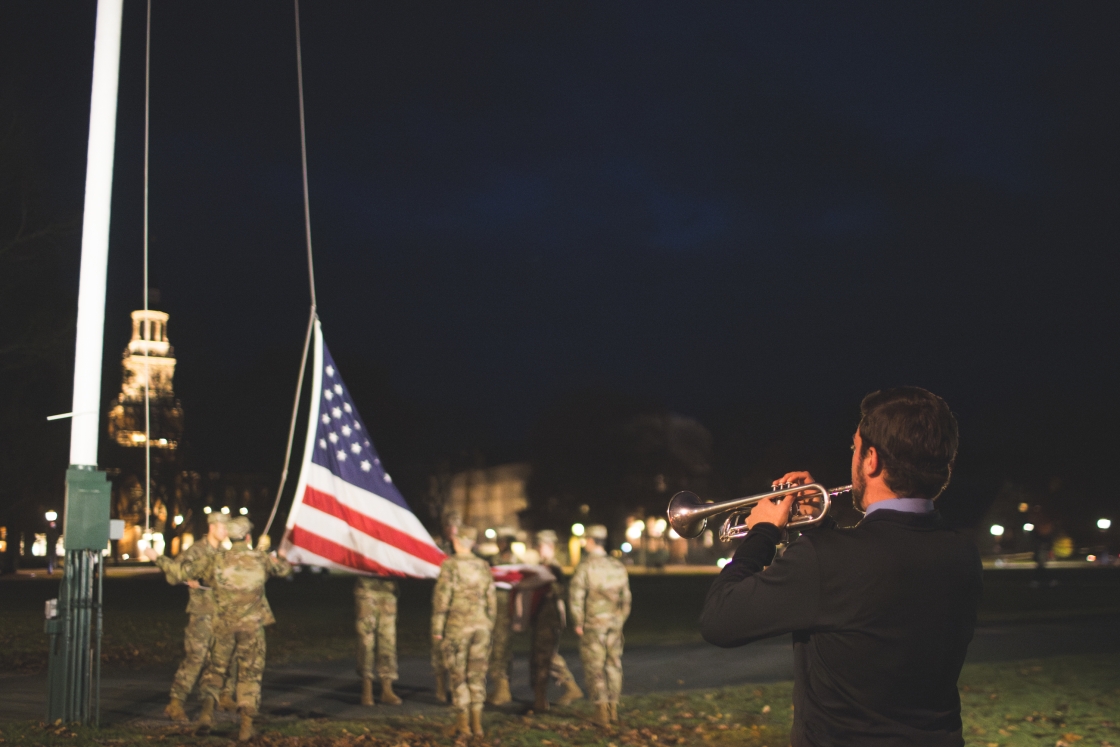Roger Federer Holds Court at Dartmouth Commencement
Congratulations, Class of 2024! Today I want to talk to you about finding joy.
Many of you have heard me describe the psychological research about our multiple ‘selves.’
Each of us walks around, every day, juggling a number of roles: Student. Son. Daughter. Friend. Co-worker. Our perspectives are constantly changing. We contain multitudes.
As we’ve seen clearly over the past year: The world contains multitudes also. Cut-and-dry answers are hard to come by.
One thing I hope you have learned at Dartmouth is not to seek out the one, irrefutable truth.
It’s to live and lead in a world that contains those multitudes - and to find joy in that complexity and uncomfortableness.
A few weeks ago, a student came to my office to tell me that they disagreed vehemently with some of the decisions I have made this year. But they also asked questions that let me know they were open to different interpretations of their viewpoint; and let me ask questions back in return. They also brought me snacks … because, they said, they wanted me to feel nourished in an obviously difficult moment.
I tell this story not only because of the snacks — which I appreciated — but because it’s a beautiful example of what Dartmouth has taught each of you to do:
Remember the humanity of your colleagues, friends, neighbors, and understand their points of view — even when they’re in sharp opposition to your own.
Understand the massive challenges our country and our world face right now — while not letting those challenges overwhelm you, every waking hour of the day.
And, know that even in moments of great difficulty … it is still okay to find joy, and encourage others to do the same.
Find joy in your well-being, using the skills you’ve learned right here. Get outside and into nature — which research shows changes how our brian functions and helps us focus.
Find joy in all the good forces in and around your life — as I was reminded this year when two students kindly asked if they could take my dog, Rosie, for a walk.
Find joy in challenging yourself.
A few years ago, a postdoctoral researcher in my lab, Jalisha Jenifer, conducted a study. She looked at about 200 high students who were getting ready for an AP calculus exam, and found something fascinating: Those students who already felt anxious about math and the exam … tended to skip the most difficult problems when they studied.
Those who forced themselves to tackle the tough problems, felt better. They performed better. They found joy in the work, even in the struggle, because they’d pushed themselves.
You have spent the past four years surrounded by impressive classmates, learning from some of the best professors in the world. You are ready for the difficult problems.
Engage with them. It will be uncomfortable and much harder than turning your backs, walking away, or just shouting your beliefs at people.
Go out of your way to have conversations with people you don’t agree with, to listen and see their shared values rather than building an echo-chamber of like minded people around you.
Think for yourself, voice an unpopular opinion, and be willing to call what you see as balls and strikes.
Challenge yourself to understand history and learn from it.
Taking a page from Dartmouth’s history, I’m pleased to share that we are beginning a new Commencement tradition here today as we incorporated the Wampum Belt, given to Dartmouth by the Mohegan Tribe, for the first time in our commencement procession this morning.
The belt is a reminder of the long and complicated relations between Dartmouth and the Mohegan Tribe and Indian Country. The belt’s purple beads signify conflict, while its white beads signify cleansing. The belt is, in its own way, a treaty: signifying a promise to honor our commitment to the Tribe and the Indigenous peoples of this land.
It also reminds us that mutual respect is born through an unwavering dedication to meaningful dialogue. It symbolizes the importance of trying to understand where the other side is coming from, and learning from each other.
Be mindful of history, but always be willing to grow and make amends.
And finally: Find joy in defining success on your terms, as Dartmouth has uniquely prepared you to do.
What you’ve learned here is to define your happiness differently.
To follow your passion with everything you have, regardless of what may interest others.
300 of you wrote honors theses; many wrote masters and PHD theses as well — an accomplishment that I’m going to guess felt like you’d won your 20th Grand Slam Title when you handed it in!
Several hundred of you attended group dinners or conversations with me in my first year — playing a pivotal part in shaping the future of Dartmouth for those who come next.
Each of you found your place in this community.
Each of you is carrying forth Dartmouth’s timeless values:
To ask hard questions.
To solve big problems.
To come together in community and bring people with you.
To be the voice crying out in the wilderness. Vox clamantis in deserto.
There is joy in living out those values.
There is joy in the world to seek out, as we are reminded this morning.
And there is joy in being part of this Dartmouth family.
Always remember we’re here for you. We cannot wait to see the places you’ll go. And how each of you finds joy. Congratulations.

